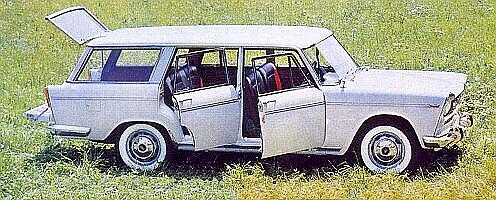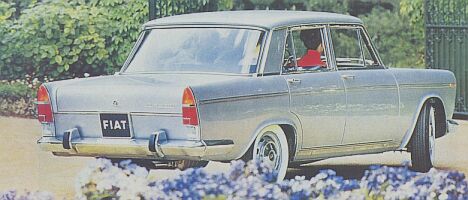Mechanically the 2300 retained the basics
of the 1800B, torsion bars at the front and leaf springs at the rear. The
automatic clutch was also an option on the 2300, which also got the option
of an overdrive. As in the 1800B, disc brakes were fitted on all wheels.
1963
saw the introduction of another version of the berlina, the 2300 Lusso,
which replaced the standard 2300 berlina and was also produced as a Familiare
model. Numerous modifications were made, including (for the first time
on a Fiat) the fitment of an alternator and 'lubricated-for-life' bearings.
The options list grew to include power steering, an automatic transmission
Production of the 2300 Lusso continued
until 1968, as did the 2300S Coupe. Production figures for these models
are rather vague, 155,000 1800Bs and 2300s (all versions) are claimed to have been built. Included in that total are around 3,500 Coupés (both versions).
The 2300 was used as a basis for various concept and limited production cars. See our pages
on Ghia (who made coupé, spider and hatchback/estate versions), Moretti and Savio for details and pictures.
Michelotti and
Pininfarina also built one-off coupés based on the 2300S.
It should also be mentioned that a Fiat 2300 berlina took part in the 1963 Safari Rally.
After 5,300km it was one of only seven of the original eighty-four cars to finish, taking fourth place overall and second in class.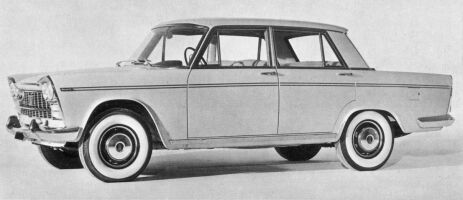 Introduced
simultaneously with the 1800B in 1961, the
2300 replaced the 2100 and included most of
the 1800'B' modifications (such as brakes and suspension) plus some extras.
These latter included a 2279cc engine with 105bhp and a slightly redesigned
exterior, most noticeably featuring twin headlights (rather than the single
units on the 1800/2100) and a double chrome side-stripe. As with the preceding
model, there was a Familiare estate version and a Berlina Speciale which
had a wheelbase extended by 80mm. The latter kept the distinctive grille
from the 2100 Speciale and also gained a single chrome stripe which extended
as far back as the front door.
Introduced
simultaneously with the 1800B in 1961, the
2300 replaced the 2100 and included most of
the 1800'B' modifications (such as brakes and suspension) plus some extras.
These latter included a 2279cc engine with 105bhp and a slightly redesigned
exterior, most noticeably featuring twin headlights (rather than the single
units on the 1800/2100) and a double chrome side-stripe. As with the preceding
model, there was a Familiare estate version and a Berlina Speciale which
had a wheelbase extended by 80mm. The latter kept the distinctive grille
from the 2100 Speciale and also gained a single chrome stripe which extended
as far back as the front door.
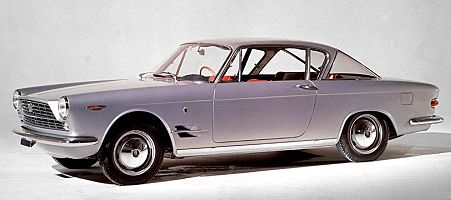 The 2100 had been used as the basis for
a Coupe by Ghia, shown at the Turin Motorshow in 1960. Late the following
year this car was officially released by Fiat, now based on the 2300. Two
versions were made available, the 'normal' 2300 Coupe and the 2300S Coupe.
The latter had two twin choke sidedraught carburettors (Weber 38DCOEs)
and produced 136bhp. Incidentally, this engine was developed by Abarth.
The chassis was built by Fiat then transported to Ghia who fitted their
bodywork. The semi-finished car was then transported back to Fiat for completion.
Production of the 105bhp 2300 Coupe stopped in 1964 since almost all sales were of the 2300S version.
The 2100 had been used as the basis for
a Coupe by Ghia, shown at the Turin Motorshow in 1960. Late the following
year this car was officially released by Fiat, now based on the 2300. Two
versions were made available, the 'normal' 2300 Coupe and the 2300S Coupe.
The latter had two twin choke sidedraught carburettors (Weber 38DCOEs)
and produced 136bhp. Incidentally, this engine was developed by Abarth.
The chassis was built by Fiat then transported to Ghia who fitted their
bodywork. The semi-finished car was then transported back to Fiat for completion.
Production of the 105bhp 2300 Coupe stopped in 1964 since almost all sales were of the 2300S version.
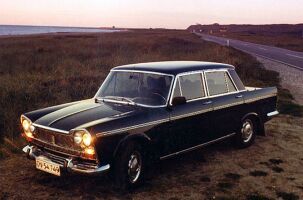 and a complex internal ventilation system. Various small changes were made
both internally and externally, rubber overrider inserts being one of the more noticeable.
and a complex internal ventilation system. Various small changes were made
both internally and externally, rubber overrider inserts being one of the more noticeable.
Technical Details
| Driveline | longitudinal engine at front with rear wheel drive |
| Engine | 2279cc (78x79,5mm) ohv straight-six with 105bhp @ 5,300rpm
in 2300S Coupé 136bhp @ 4,000rpm |
| Suspension | front : Independent, torsion bars and telescopic dampers plus anti-roll bar
rear : solid axle with telescopic dampers and coil springs wheelbase : 2650mm (Speciale : 2730mm) track (front/rear) : 1345mm/1307mm (Coupé 1350mm/1312mm) |
| Brakes | front : discs
rear : discs handbrake : cable operated on rear callipers |
| Gearbox | 4 speed manual plus optional overdrive
3 speed automatic (optional) 'Saxomat' automatic clutch (optional) |
| Steering | worm and roller |
| Kerb weight | Berlina : 1285kg; Familiare : 1345kg; Speciale : 1320kg; Coupé : 1324kg |
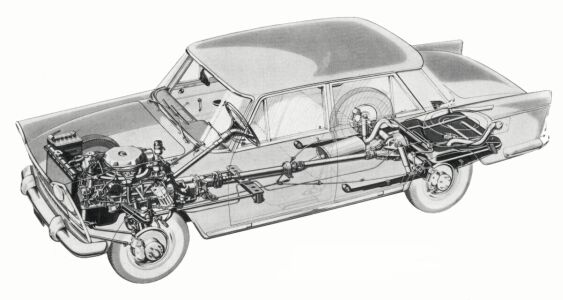
For books on Fiats see our Online Bookstore
There is also a list of all our picture galleries (including museums, motorshows and various events).
Wallpapers/Desktop Backgrounds of numerous Fiats also available to download.
Buying
A few things to look for when considering buying a 2300 Coupé :
1. Headlamp reflectors have a tendency to rust.
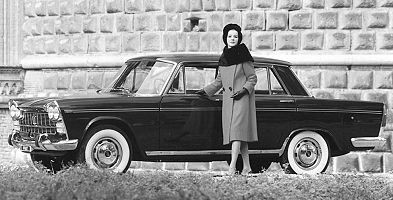 There are not many of the big saloons left, but the coupé is both easier to find and more desirable.
There are not many of the big saloons left, but the coupé is both easier to find and more desirable.
2. Check for corrosion around the A-pillar and inner wing, water gets trapped inside the secions.
3. The three-piece rear screen can let water in and cause corrosion below.
4. Check the brake pedal, both with and without the engine running, the booster is a weak point.
Other small things to check (which can be difficult or costly to repair) are the presence of all the interior trim, especially chromework,
the wheeltrims for presence and damage and the timing chain for rattling.
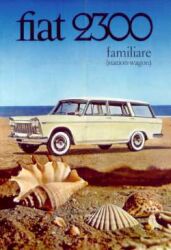 2300 comment form
2300 comment form
Your Comments
Anybody still got a 2300 ?
Copyright © 2000 to 2008 CarsfromItaly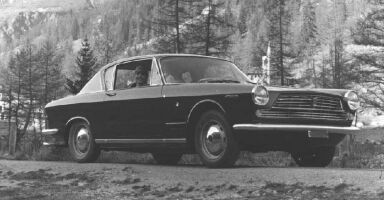 Use
the buttons at the top to navigate further, or
Use
the buttons at the top to navigate further, or
